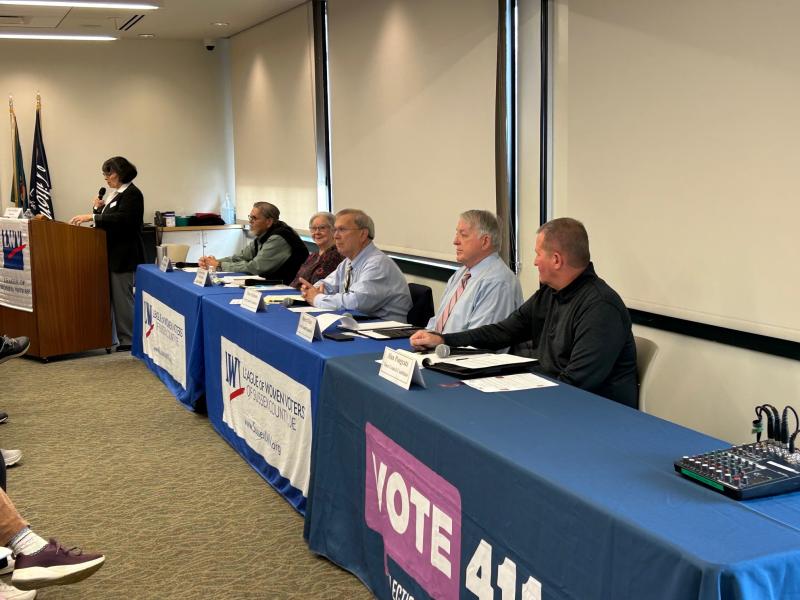Milton candidates face voters before March 1 election

A packed room at Milton library was the backdrop for the five candidates in Milton’s upcoming municipal election making their pitch to voters.
Taking part at the Feb. 15 candidates forum, hosted by the Sussex County League of Women Voters, were mayoral candidates John Collier and Lee Revis-Plank, and town council candidates Tom Arkinson, Robert Gray and Alan Pongratz.
The candidates were allowed to make an opening statement, where they discussed their backgrounds and issues that are important to them. The candidates then took questions submitted by the audience, which had both a period for longer, three-minute responses and a short, 30-second lightning round, before making a closing statement.
The first question was about how each candidate would manage Milton’s growth while retaining the character of the historic downtown area.
“This is a really complicated question that I should have more than three minutes for,” Revis-Plank said.
She said there are a number of avenues the town could take to curb development, such as impact fees on annexation, a moratorium on annexation and a cap on the number of new houses being built. However, she said, there could be unintended consequences to such measures, such as developers going through Sussex County, a situation where new homeowners would be using town services without being part of Milton’s tax base. Revis-Plank said there is also a commercial component, where the town should be encouraging more mom-and-pop-style businesses, and doctor’s and dentist’s offices.
Collier said he shared much of Revis-Plank’s vision on growth, and that during his time as mayor, he has spoken before Sussex County Council on several occasions about the impact of growth in the Milton ZIP code and that the town would like the county to do something as far as how it manages growth in the area. Collier said the comprehensive plan also serves as a handy guide for future growth in Milton, a document he was actively involved in drafting.
Pongratz said infrastructure should be in place before making decisions on new annexations.
Arkinson said he would like to see changes to the zoning code to both encourage more small businesses and to allow for more affordable housing.
Gray said the town’s growth needs to come from the commercial sector more than residential. He suggested a public facilities ordinance that would make it so there would be no final-site plan approval until all the utilities are added. Gray said the town should also protect the area of the wastewater treatment plant once that plant is removed and Artesian moves operations out to Route 30.
Affordable housing was also brought up, as was the idea of legalizing accessory dwelling units to create more affordable housing. Collier and Arkinson both said at this point, it is too early to have concrete plans on affordable housing, but the town has compiled an ad hoc committee report on the issue that is set to be worked on by the planning and zoning commission as an advisory report and possible ordinance language.
Gray said there are various ways to get more affordable housing, including what he called inclusionary zoning, in which the town would make developers include affordable housing units as part of a development.
Revis-Plank proposed a plan where the town would require developers to donate a habitable lot to Habitat for Humanity for every 5 acres of land to be built on.
Pongratz said the big issue in creating affordable housing is how to convince developers that there is profit in doing so. He recommended a comprehensive study and discussions with other towns for how they created more affordable housing units.
On the subject of accessory dwelling units, Collier said ADUs are not a simple solution and the issue needs additional study before the town moves forward with allowing them. Arkinson and Gray both said they support ADUs, while Pongratz said he supports the idea but that it needs additional study. Revis-Plank said ADUs are an option but one she is not 100% sold on.
The candidates were asked several questions regarding traffic, including reducing speeding and large truck traffic, and whether they like recent changes by the Delaware Department of Transportation creating four-way stops.
Revis-Plank said the solution to speeding is additional enforcement, while issues of truck traffic would involve cooperation from DelDOT to help guide trucks around town. Revis-Plank said while the four-way stops have been good in limiting accidents, there are still motorists ignoring the stop signs and speeding right through.
Pongratz said the new four-way stops have been very helpful in reducing speeding, and he thinks they have been good for the town.
Arkinson said curtailing speeding comes down to enforcement. He said he’s run into several confused truck drivers coming through Milton because their GPS guided them through town. He said the town could have better signs showing the alternate route around town.
Gray said trucks will need to come downtown to deliver to the businesses. He said Milton could do more to enforce speeding, including speed cameras if necessary. Gray also liked the new four-way stops.
Collier said speeding and truck traffic have been issues for as long as he has lived in Milton. He said much of how the roads are governed is done by DelDOT, as it maintains the roads. He said the town is conducting studies that can be submitted to DelDOT for potential action. Collier said he supported the new four-way intersections.
“Towns evolve, and Milton is evolving,” he said.










































